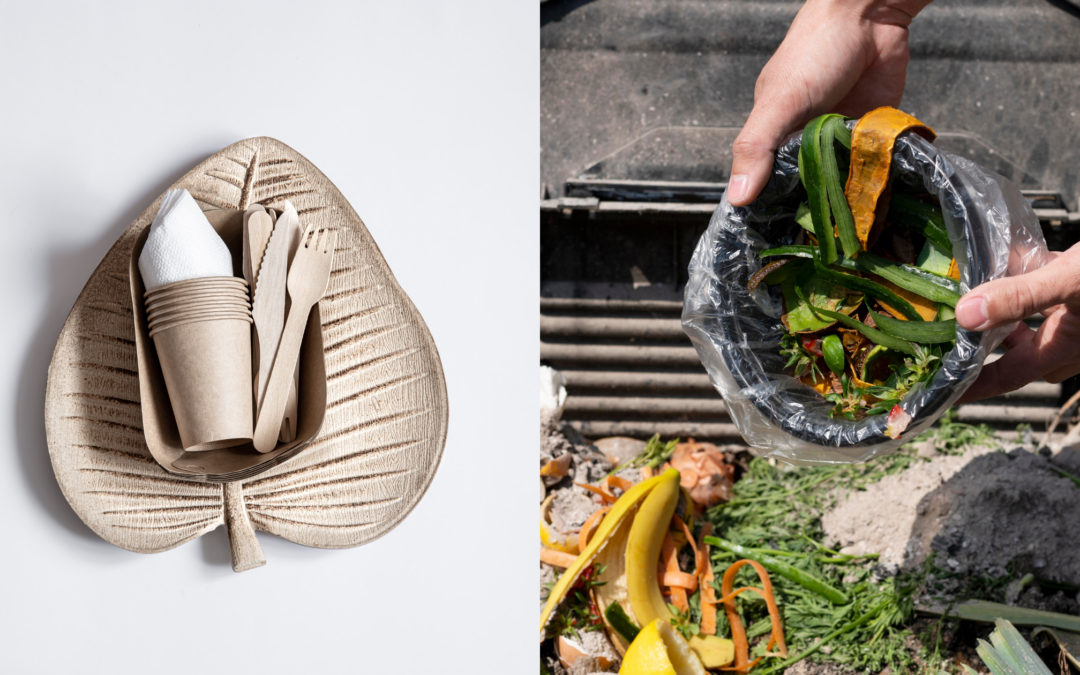In order for a product to be deemed eco-friendly, we need to assess the impact that it has on the environment from the start of its lifecycle until the end. This encompasses everything from how the raw material is harvested and extracted and the production methods through to how the product is used and disposed of at the end of its useful life.
There are several methods of disposal for a product that can qualify it as sustainable because of the little negative impact it has on the planet. This includes recycling, repurposing, reusing and, the two we are exploring in this blog, biodegrading and composting.
If a product (or material) is labelled as biodegradable or compostable, as many of ours are, then it is far more eco-friendly than a product that can only been throw in a bin where it will end up in a landfill or the ocean.
It’s important to have a clear understanding as to what these terms mean as, although they have a few similarities, the two are very different yet people often make the mistake of using them interchangeably.
What does it mean if a product is ‘biodegradable’?
If a product is biodegradable it means that it breaks down and decomposes into natural elements, such as carbon dioxide, water vapour and organic material, over time with the help of microorganisms thereby avoid pollution.
Most materials are in fact biodegradable because they will all eventually break down given time; however, some can take hundreds of thousands of years to biodegrade which is where it becomes a problem. A company can make the claim that their products or packaging are made from biodegradable materials – which is true – but when it takes these materials a long time to break down, they do cause a lot of harm to the environment so are, therefore, not eco-friendly.
A biodegradable material only becomes eco-friendly when it biodegrades quickly (i.e. within a year or less) and completely breaks down leaving nothing but natural elements behind. In short, the quicker it biodegrades, the greener it is.
If you want to identify a biodegradable material that is actually good for the environment then anything plant-based, animal-based or natural mineral-based will usually fall under this category; some examples include bamboo, cork, hemp and jute.
What does it mean if a product is ‘compostable’?
If a product is compostable it means that, given the right conditions, it can break down and be used as compost when it decays. Essentially, this provides the earth with nutrients giving back to the environment rather than damaging it.
The composting process usually takes about 90 days and requires you to regularly water your waste and keep it at a particular temperature. As a result, it can be difficult to go through this process at home so they will need to be sent to a compost facility.
All compostable items are technically biodegradable and can even be considered a form of recycling as the material is being reused.
Some examples of compostable materials include grass clippings, vegetable food scraps and cotton.
Compostable vs Biodegradable: What’s The Difference?
Although they share some of the same characteristics, there are clear differences between biodegradable products and compostable ones and it is important that we recognize this to ensure that we’re disposing of materials and products correctly.
The biggest difference is that compostable materials need specific conditions, or biological processes, to aid in their decomposition whilst biodegradable materials only need to be exposed to certain microorganisms. This makes it easier to dispose of biodegradable products.
Biodegradable materials also break down into several natural elements whilst compostable materials leave behind a single organic matter called humus.
All in all, the main takeaway is that both biodegradable and compostable products are great for the environment but when you see these terms they should not be taken at face value.
Though there are problems with both methods of disposal as compostable materials aren’t easy to dispose of in the right way and biodegradable materials that don’t do further harm to the environment can be hard to identify, they are still sustainable practices that should be encouraged.
In line with our sustainability principles, we can create and source a range of products that are truly biodegradable or compostable, including bags and packaging, with no greenwashing in sight. Learn about some of the other ways in which we uphold our sustainability standards

